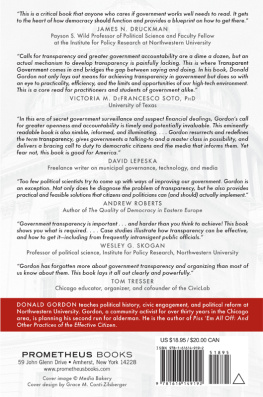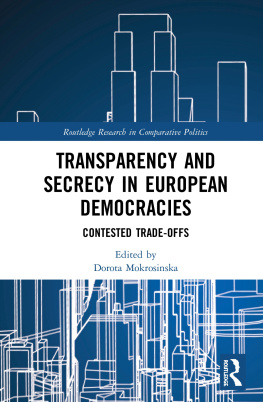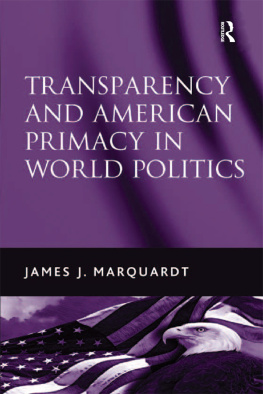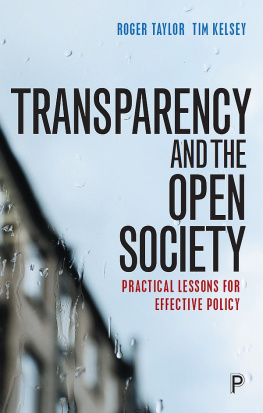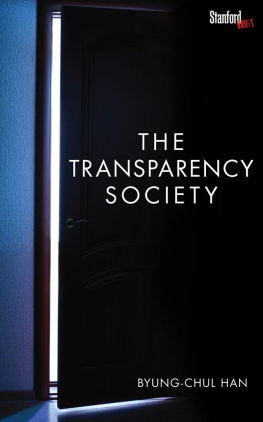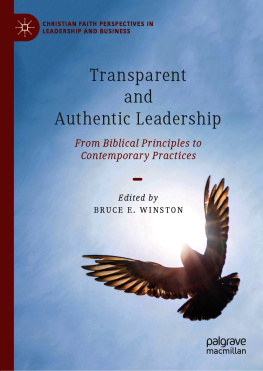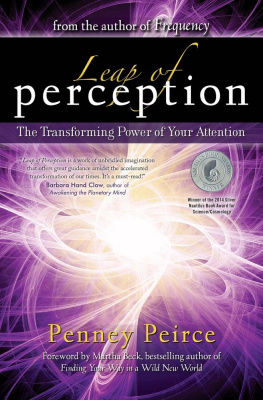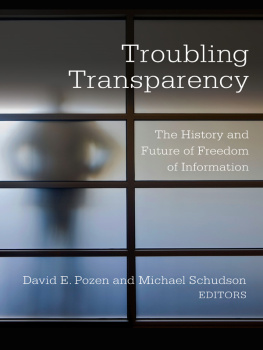First I want to extend my deepest thanks to my agent, Nancy Rosenfeld, who believed in my work, appreciated my passion, and was so dedicated in finding just the right publisher for my book. I reserve a heartfelt gratitude to Steven L. Mitchell, who saw in me and my devotion to our democratic principles a kindred spirit whose ideas needed to be promoted and promulgated to as wide an audience as possible. And a special thanks to Jade Zora Scibilia, whose expert eye for editing and many weeks of patient advice made this work comprehensible and easy to read.
Finally, I would be remiss in not mentioning that much of the inspiration for my writing came from my students at Northwestern University, who often challenged me as much as I did them. Through my courses on transparency in government, they were a constant source of ideas. In particular, I would like to thank the following students whose research greatly contributed to this book: Karen Badawi, Phil Boardman, Nicole Bronnimann, Peter Contos, Brandon DeLallo, Elizabeth Franz, George Geiger, Matt Marcus, Shireen Ali Mirza, Jessi Reber, and Bryan Weber.
I truly believe that this generation of young people are up to the task of creating a more open and responsive government, espousing the new politics of civic engagement, embracing the ideals of our founders, and thus securing our democracy for the twenty-first centuryor I never would have written this book.
The liberties of a people never were, nor ever will be, secure, when the transactions of their rulers may be concealed from them.
Patrick Henry, June 9, 1788, Virginia Constitutional Convention
What is this thing we call transparency in government? And why has the word transparency become so ubiquitous that it has replaced the word reform as the new mantra of any politician who wants to get elected or stay in office? In fact, the word transparency has been used so often that it has become virtually meaningless.
How are we to know when the actions of our elected representatives or civil servants contribute to more transparency in government or are simply so much political spin? Does it really matter if we know the difference? Is more transparency in government a good thing and something we should strive for, or can it be a detriment to good governance?
These are important questions that must be answered if we're to survive as a democracy, and, as one of America's founders, Patrick Henry, so aptly put it, if we're to retain our liberties as a free people. Yes, it's that important!
WHAT IT IS
Let's be clear, right from the beginning, that you and Iand every American citizenhave a right to full transparency regarding any facet of our government. It's not a question of what but when. Almost all information about our government should be made accessible as it becomes availablewe have the tools to do that. What remains, information that would be classified as sensitive, should be made accessible when it becomes prudent to do so within a reasonable period of time.
There is no information about our government that should be sequestered for an indeterminate period of time or withheld simply to appease the desires of those in government. This isn't just a personal opinion, which you will see as this book unfolds. It is the opinion of many great thinkers who have preceded us throughout our history, so you and I stand on very firm groundor should I say shoulders? Yet after more than two hundred years, transparency in government continues to elude us. If we are to propose and defend the notion of full transparency in government, we first must come up with an acceptable definition of transparency in government. We all have to be using the same language, so to speak, when talking about transparency. Ask citizens if they are for transparency in government, and they will say yes. Then ask them what it means, and you will get a different, if nuanced, answer every time.
More important, without a definition that can be commonly agreed upon, many in government will spin their own ideas of what transparency means. Experience has shown that their definition will often pale in comparison to the more rigorous interpretation we are about to producesometimes so they can avoid the work of providing true transparency, sometimes so they can avoid the awkward and embarrassing exposure that comes with opening government to public scrutiny.
If It Looks Like a Duck
If we're to discuss transparency, we must objectively come up with a comprehensive definition that will be immediately recognizable and widely accepted. You know, like distinguishing a duck from, say, a kangaroo. We need the quack, the waddle, and the webbed feet, or we don't have a duck. We need obvious characteristics and discernible boundaries.
So let's start where most definitions start: with a dictionary. I used the Oxford online dictionary, and as you might suspect, its primary definition of transparency is the condition of being transparent. Well that's not very helpful! Let's move on, then, to its definition of transparent. Several definitions are given, but the meaning that's relevant for us is:
Easy to perceive or detect:
- having thoughts or feelings that are easily perceived; open: you'd be no good at pokeryou're too transparent
- (of an organization or its activities) open to public scrutiny: if you had transparent government procurement, corruption would go away
In particular, note the references to easily perceived and open to public scrutiny. To easily perceive something you need a clear understanding of what it is you're looking at. In other words, it must be comprehensible. When we open government to public scrutiny, the implication is that whatever you're looking at is easily accessible. Keep both of these concepts in mindcomprehensibility and accessibility. We'll need them later.
By the way, the word transparency comes from Medieval Latin (Latin as written and spoken ca.700ca.1500) meaning to shine a light through. It was first used in the sense of easily seen through in the 1590s. Now, when was the last time you envisioned government of any kind being easily seen through? When was the last time you imagined that you, the average citizen, could shine a light through the morass of policies and laws that we've come to know as government?
Consider some synonyms for transparent: clear, plain, lucid. Be honest. Are those words that come to mind when you think of government? Now consider some antonyms for transparent: cloudy, dark, opaque. Now we're getting somewhere!
So far we have explored definitions for transparent, and a few synonyms and antonyms to boot. Let's build on all that and apply it toward a practical, empirical definition of transparency in government, one that we can use every day and that we can hold our elected officials and government employees to.
Pick a Card, Any Card
Any magician worth his or her salt is good at the arts of deception and diversion, and a politician is like a magician in a business suit. Often what is sold as transparency is simply the deceptive or diversionary tactic of making disclosure appear to be transparency. But waitaren't they the same, disclosure and transparency? On the contrary, they are quite distinctive. So, back to the dictionary, which defines

